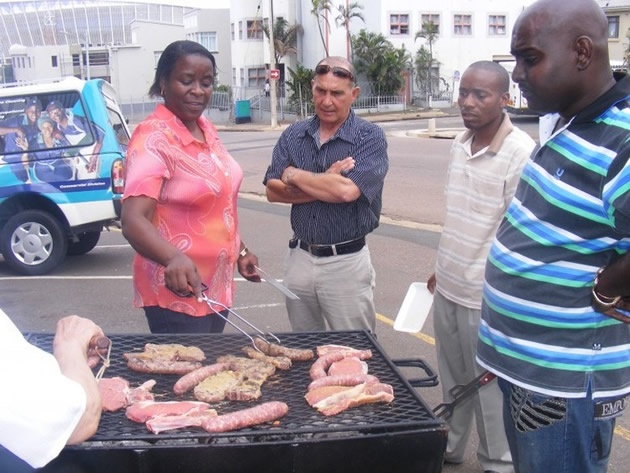Celebrating the idea of bringing, sharing food

Dr Sekai Nzenza On Wednesday
LAST Saturday afternoon I walked into my dressmaker’s workroom which is at the back of an old hotel in Harare. Mai Chaka, the dressmaker, was sitting next to her sewing machine eating sadza with meat mixed with vegetables.
In the corner was her assistant Chipo, also eating the same.
I was not hungry, but the smell of food was appetising. I greeted them quickly without shaking their hands.
When you find others eating, you would normally pause for a little while then wait for them to say, tirikudya, meaning we are eating and you can join us.
I did not wait for them to say that.
These were my friends.
I found some water in a bowl under the sewing machine and washed my hands. Without asking, I took a morsel from Mai Chaka’s plate, dipped it in the sauce and vegetables.
She laughed and said, “There is more sadza and meat in the two small pots next to the hot plate.”
I then served myself to a quarter of what was left, leaving some in case another person walked in.
We sat there, in between three sewing machines surrounded by material and cotton threads.
Hanging on the wall were finished dresses and unfinished ones.
Church uniforms hung comfortably next to political party outfits and other African prints.
“I should have said, please wait outside because we are eating,” Mai Chaka said, finishing off her plate and leaving it almost clean.
Chipo then looked surprised and asked why Mai Chaka would have said that.
“Chirudzii nhai?” What kind of behaviour would that be? “That is what the missionaries used to do to us,” Mai Chaka casually said.
She then told us that when she was at a mission boarding school in the Eastern Highlands, she learnt that Europeans and other Westerners only cook enough food for the husband, wife and children. They do not expect anyone to drop in and join them at the dining room table unless they are invited.
“What if you are hungry and you happen to arrive unexpectedly? Would they still let you sit there while they eat?” asked Chipo.
“Yes, that is European culture,” Mai Chaka said.
I then recalled the days when I first learnt about this cultural difference of eating and sharing food between us and people from Europe, America and other Western countries.
When I was at the Methodist boarding school, my friend Betty and I were often asked to skin rabbits for Miss Davis’ dinner.
She was the English missionary who taught us agriculture and kept rabbits and chickens. When the rabbits were getting too many, she did not trust the boys to slaughter them for her because they would hide some of the pieces.
Betty did the killing while I helped her. It was cruel to kill animals that way back then.
But Miss Davies said people and animals were created to feed on one another.
In Shona we knew the saying: “Kakara kununa hudya kamwe.”
For an animal to be so fat, it means it is eating other animals.
With that in mind, we did not really feel sorry for the rabbits we killed for Miss Davis’ Sunday dinner. But we wanted to eat them too.
One time after church service, Miss Davis said we should come and slaughter a rabbit.
We knocked on Miss Davis’ door.
She came out, with a napkin around her neck and said, “Miss Hutchinson and I are having our lunch. Stay on the verandah until we are finished. Then I will show you which rabbit is for slaughter.”
The door was open.
We sat there outside salivating on the smell of foreign food.
Maybe it was roast, beef or maybe beef stew with carrots and potatoes or even roast chicken or schnitzel. We could hear the sound of folks and knives, conversation and laughter.
Betty and I kept on walking across the verandah quietly just to catch a whiff of the smell of food.
Whatever it was, we wanted it to eat it too. Then they finished lunch and drank some tea and ate some cakes.
They placed the leftovers on the sink and came out to show us the rabbits for slaughter.
I could still smell the food on Miss Davies and felt hungry. While skinning the rabbit, Betty and I asked each other why the missionaries did not share their food with us.
Betty said if Miss Davies had asked us to eat with them, then all the students would want to do the same.
But I remember telling her that she was wrong. If the two of us had been given leftover bread or potatoes, how many students would have lined up wanting some as well?
Years later, when I was studying in Australia I was invited to a barbecue to celebrate horse racing day called the Melbourne Cup.
The hosts were friends of my friend Alison.
We bought meat, sausages and wine to take to the barbecue with us.
I asked why we were taking food and alcohol to a party. That was when Alison told me about the concept of BYO, bring your own.
This means, if you are invited for lunch, dinner or a party, you bring along a bottle of wine, flowers or something.
Then you give it to the host or hostess in appreciation of the meal cooked.
But for new Zimbabweans in the Diaspora, BYO is still a big challenge.
My cousin Reuben who lives in Australia complains all the time that the brothers bring nothing to a party and they will feast on your meat, sadza and beer. When I was there earlier this year, I saw that happen.
One guy from Zimbabwe called Tawanda came with two other friends from Tanzania who ate large quantities of sadza with meat and fish.
When full, Tawanda patted his tummy, burped and slapped Reuben on the shoulder saying, “Hey, mukoma, your wife sure knows how to feed people the Zimbabwean way. That is how we do it back home.”
There was uproar not just from Reuben, but from others as well, telling Tawanda that he should have brought something with him.
Others called him a free loader. They said life has changed and the economy was bad here in Australia and also in Zimbabwe.
Tawanda should also chip in something so we can all eat and enjoy food together.
But Tawanda raised his voice above all the noise and argued, “This is my brother’s house. Right? Why should I bring my own beer to his house? I am not a muzungu. I come here to eat and drink with my fellow Zimbabweans. We are all related, right? Why should I come here carrying food?”
When the noise had calmed down, Reuben slowly and diplomatically explained that it was time we balanced the culture of sharing food and adopt the Western idea of bringing something.
Then he told us an incident that happened last time I had a gathering for relatives, back here in Zimbabwe.
When one of my relatives from was leaving, he grabbed one expensive bottle of red wine and four beers.
That bottle had been given to me as a birthday present some time last year. It was special and I wanted an occasion to enjoy it.
I tried to grab the bottle and said, no, I will not let you take that bottle. But I could see that it was going to be a dangerous wrestle for the bottle.
The guy argued that my grandmother, Mbuya VaMandirowesa was his great aunt.
Therefore, I was also his aunt and he had the right to pick what he wanted from my house.
“When I see you, I see Tete VaMandirowesa. So why can’t I enjoy this bottle of wine to honour the ancestors.”
This guy was too young to have ever seen my grandmother. Besides, he had grown up here in Mufakose and had never crossed the Save River to visit the village.
To resolve the problem, I went into the house, found one of my cousin Piri’s cheap cane gin or something lethally bad like that and gave it to my new great nephew.
He happily accepted the exchange and handed over the red wine bottle, saying the gin was even better than the red wine.
Back here in Zimbabwe, the idea of BYO, is taking time to be accepted.
Most of my relatives do not bring anything along.
I also do not expect them to do so because they would have struggled to get money for a kombi to visit me.
But others with a little bit more money always bring a bottle of wine, food or something.
“But, sometimes I think the European missionaries were right in not sharing their food,” said Mai Chaka as she fitted, pinned and adjusted the darts on the dress she was making for me.
“Why?” her assistant Chipo asked.
“Because we do not often know the limit of accepting generosity. At one church meeting, during tea time, I saw a lady add 8 teaspoonfuls of sugar to one cup of tea.
“Then she hoarded three cup cakes instead of picking one. Would you ask her to come for tea again?” she asked laughing.
Still, to have more conversation, fun and fellowship while eating together, we must change the culture that says the host pays all.
- Dr Sekai Nzenza is an independent writer and cultural critic.









Comments